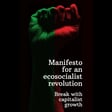Become a Creator today!Start creating today - Share your story with the world!
Start for free
00:00:00
00:00:01

The 'crisis of masculinity' and the far right
A discussion with Odin O'Sullivan about the growth of the manosphere and the often reactionary, misogynist ideas that drive it. O'Sullivan looks at the influence of people like Andrew Tate, Joe Rogan and Jordan Peterson. in conversation with Simon Hannah
Transcript
Introduction and Guest Overview
00:00:00
Speaker
Welcome to this episode of Anti-Capitalist Radio. My name is Simon Hannah. We're joined today by Odin O'Sullivan, who is a researcher of cultures of masculinity and the contemporary far-right and populist movements. He's also an intransigent communist and Marxist he wanted me to describe him as, so that should give you a bit of a flavour of what you're going to hear on this podcast.
00:00:23
Speaker
So Odin delivered this presentation at the Historical Materialism Conference, which was held in London in early November. So Odin's going to repeat the presentation at the beginning of the recording, and then we're going to have a discussion about it afterwards.
00:00:37
Speaker
Great. Thank you very, very much. Thank you very much for having me on.
Crisis Masculinity and Fascism
00:00:40
Speaker
And so this is a paper that I delivered as a stat at historical materialism entitled crisis masculinity, cultural remasculinization and fascist subjectivities. um And in this paper, I aim to kind of outline the centrality of crisis masculinity and cultural remasculinization to the generation of maintenance.
00:00:57
Speaker
of contemporary fascist subjectivities. I'll focus in on one particular aspect of my broader research on cycles of cultural remasculinization, which is the figure of the contemporary masculinist influencer and the deployment of notions of cultural remasculinization as a supposed salve for an embattled and aggrieved masculinity. In his book, Fantasy, Online Misogyny, and the Manosphere, Male Bodies of Disinhibition, Jacob Johansson argues that we are in the midst of an emergence of a particular masculinity which embodies a fascist state of mind.
00:01:25
Speaker
As such I argue that masculinity is a sociocultural force as an affect and as a political force is of vital importance when it comes to understanding contemporary fascism. This form of masculinity thrives in online spaces with Debbie King noting that social media is especially well suited to the amplification of new articulations of aggrieved manhood. I contend that a core part of this emergent masculinity is the concept of remasculinization.
00:01:49
Speaker
This remasculinization is always at first a cultural one. Alberto Toscano argues in Late Fascism that in our contemporary moment, the superstructure sometimes seems to overwhelm the base.
Cultural Remasculinization and Media
00:01:59
Speaker
As though forces and fantasies once functional, the reproduction of a dominant class and racial order have now attained a kind of autonomy.
00:02:07
Speaker
Cultural remasculization emerges out of the super structural excess and that it's reference points both in what it is reacting against and striving towards are cultural. This can be seen in the right constant invocation of the culture war, which for example, materializes in things like visceral and violent reactions, black and minority ethnic characters in video games and legacy franchises, the boycotts of products that use LGBTQ celebrities as brand spokespeople. And they're often their use of 1950s advertising material to invoke a last but regainable past.
00:02:37
Speaker
Thus, I argue that culturally masculinization emerges forcefully in the current epoch in reaction to the crisis of masculinity and continues to be a significant force on the right.
00:02:48
Speaker
The crisis of masculinity has become a central facet of free political and cultural discussion and is often situated as a phenomenon unique to the last 50 or so years.
Historical Context of Masculinity Crises
00:02:57
Speaker
and This is not the case, as Jurgen Marchukat points out in his book, The Age of Fitness. um He argues that in the late 19th century, commentators spoke of an outright crisis of American society fueled by dynamic migratory movements that unnerved white Anglo-Saxon Protestant America, which feared the loss of its social and political hegemony.
00:03:15
Speaker
The rise of the first women's movement in this period also inspired profound fears among white men. And Marcia Kerr is right when he states that since the late 1800s such crises of masculinity have all too often been taken akekin as a sign of an overall crisis of society rather than what they are, a reaction to the challenging of white heteropatriarchal masculinities hegemonic dominance.
00:03:36
Speaker
I work here from the understanding that the contemporary crisis of masculinity is in fact a useful cover for what Tascano calls preventative counter reform.
Online Influence and Toxic Masculinity
00:03:44
Speaker
The deployment of reactionary cultural fantasies such as cultural emasculation and gender ideology allows the forces of reaction to construct a counter reform to an illusory enemy. In attacking phantoms that it itself creates, the crisis of masculinity he can continue forever, selectively deployed to remasculinise an insufficiently masculine culture at will.
00:04:05
Speaker
As such, cultural remasculinization is cyclical, and if we imagine remasculinization a demasculinization, often expressed on the right as feminization, has diametrically opposed in the reactionary conception of gender and sexuality. We can see how the contemporary crisis of masculinity is constructed as a moment in which the demasculinization half of this conflict is triumphant. Such a perception is part of what mobilizes cultures of remasculinization.
00:04:29
Speaker
But in fact, masculinity constructs itself as always in crisis, and as such is always remasculizing itself in the face of a fabricated feminization. Rather than a crisis of masculinity, it is worth thinking about it as crisis masculinity, a form which understands itself as always under siege and which radicalizes itself in order to better maintain its hegemony. Much like neoliberalism as crisis governance, masculinity in this period does not seek to surmount or exit a crisis brought on by external factors, but is strengthened by crisis itself.
00:04:59
Speaker
such remasculinization moved cyclically from crisis to crisis alongside neoliberal regimes of capital accumulation and dispossession. With this said, it is pertinent to provide a short analysis of specific key online figures whose massive popularity and influence stems in part from the legitimation of this aggrieved manhood.
00:05:19
Speaker
and These men are not aberrations and nor are they wholly new archetypes. A figure like popular misogynistic influencer and alleged human trafficker Andrew Tate has notable antecedents that are both real and fictional. For example, scholars such as Sally Robinson, and Jacob Johansson and Henry Giroux have identified Tyler Durden from the 1999 film Fight Club as a significant precursor to figures like Tate and that he's an idealized version of the man that does not need women.
00:05:45
Speaker
This in turn hearkens back to older orders of fascist misogyny. Jack Braditch argues, inspired by Klaus Tulett, that the notion of man without woman is a key factor in auto-genetic sovereignty. Braditch posits that the Palin genetic project of masculine rebirth seeks a fantasy without bio-reproduction. It is replication without reproduction, what Alberto Toscano calls the reproduction of male power without and against women.
00:06:10
Speaker
Thus, Tate's content is focused on remasculinization to the subjugation and exploitation of women. He emerges from the seduction slash pickup artist community and serves as something of a guru for disaffected young men, much in the way Durden does, but on a much larger and digitally disseminated scale.
00:06:28
Speaker
Tate has a history of violent misogyny and is currently facing five legal investigations in the UK and Romania, ranging from sexual assault to human trafficking. He has called himself a proud misogynist and, among other things, has argued that women are men's property and that sexual assault victims share responsibility for their assaults. He has claimed that men have been fundamentally emasculated due to a feminist culture and that feminists themselves, who he calls females who lack masculine guidance, seek to destroy the world.
00:06:55
Speaker
This is a fascist misogyny with a long historical tradition, as can be seen in Clause 2 with its analysis of the spectre of the castrating woman in proto-fascist texts. He argues citing the writings of Freikor soldiers that the proletarian woman, or the rifle woman, is constructed as having a phallic potency that terrifies the soldier males of the Freikor.
00:07:14
Speaker
The proletarian whore in these texts is a natural catastrophe, a freak for her unwillingness to participate in normative bourgeois culture, that is to be a married, sexless object of physical and social reproduction subservient to the husband. It is the overt sexuality and public action of these proletarian women the soldier males find to be unacceptable. Tooelet argues that in the mind of the soldier male, the sexuality of the proletarian woman, gunslinging whore, communist, is out to castrate and shred these men to pieces.
00:07:44
Speaker
I would argue that now in an era of diminished proletarian organization and dearth of class consciousness is not the threat of the proletarian woman that figures like Tate must construct as castrating, the feminist woman or the social justice warrior now fills that role. Despite a number of social media bans for the likes of Instagram and Facebook, Tate has maintained and even grown his audience. After i ah Elon Musk bought Twitter, Tate's account was reinstated and he has since amassed over 10 million followers there.
00:08:14
Speaker
During the 2024 American presidential election, Tate tweeted, I went to jail to tell the truth. The culture war was me. I changed the entire internet and I changed the culture single-handedly. Here we can see the aforementioned period that in late fascism, the superstructure sometimes seems to overwhelm the base.
00:08:31
Speaker
Tate sees the election of Trump as a victory that will transform the culture, sitting above an unchanged economic base. Shortly after this, when it was clear that Trump had won, Tate's brother, Tristan, tweeted an image showing that younger men had voted decisively for Donald Trump and stated, quote, I won't say that Covert Tate did this, but he certainly helps to do this to say otherwise would be to blatantly lie.
00:08:53
Speaker
I'm not on the habit with agreeing with fascist misogynists, but there is truth in what Tristan says. But while the Tate's would like to ascribe full mythic glory to themselves, there are a number of other figures to whom the blame for the production of a fascist subjectivity in young men can be equally ascribed.
00:09:08
Speaker
One such figure is podcaster and combat sports commentator Joe Rogan. I argue that Rogan is an important crisis celebrity enmeshed in crisis masculinity. He's a central figure of this crisis masculinity because of his attempts to maintain and inscribe the traditions of masculinity as common sense. Common sense is the residue of absolutely basic and commonly agreed consensual wisdoms that help us to classify the world in simple terms to quote Stuart Hall.
00:09:36
Speaker
Rogan may present himself as an outsider and his show as a free speech zone for open discussion and debate, but the Joe Rogan experience is in fact a space for maintaining and expanding and in certain cases radicalizing masculinity and both the gender binary and gender difference as common sense. That is, as something which does not require reasoning, argument, logic or thought, it is spontaneously available, thoroughly recognisable and feels as if it has always been there, to quote Stuart Hall again.
00:10:04
Speaker
For Rogan, violent physical activities such as combat sports and martial arts become ways to remasculinise the white male body to its supposedly rightful place, the arbiter and originator of liberty, civilisation, law and justice. This revanchist masculinity is one born out of crisis and is generated and overseen by figures like Rogan.
00:10:23
Speaker
For example, in episode 1412 of his show in which he interviews comedian and conspiracy terrorist Jimmy Doar, Rogan disc discusses the descriptor toxic masculinity. He takes a number of technological engineering works indicative of civilizational progress and ascribes them to toxic masculinity. He states, you've got to thank toxic masculinity for all the bridges, all the jets, all the rockets. They've protected this country. All the different things you can attribute to toxic masculinity, most of it is positive.
00:10:51
Speaker
It is particularly telling that the masculinity he defends and the masculinity he believes is both positive and indispensable to the American nation, is when overwhelmingly engaged with violence and the creation of weapons. The jets and rockets created and deployed by the men protecting our country, our products of tosular toxic masculinity and as such, toxic masculinity must be a bore for a pro. This aligns with the general unimpeachable position of the US military in American culture.
00:11:16
Speaker
For Rogan, this reverence extends beyond the US s military the type of masculinity it represents, a masculinity that produces men and bodies that are productive and have a capacity for violence. Further to this, ah whiteness is integral to the affective style of crisis masculinity and this inscription of masculinity as common sense. Hamilton Carroll argues that white masculinity's turn to the politics of identity is one of the most distinctive and novel aspects of this contemporary discourse of crisis.
00:11:45
Speaker
The way white masculinity mobilizes the very politics of identity that it believes are responsible for the disarticulation of privilege from white male bodies in the first place, echoes Tanya Modlesky's assessment of male power as something which is actually consolidated through cycles of crisis and resolution, whereby men ultimately deal with a threat of female power by incorporating it. It is not just female power that white masculinity seeks to absorb but and redeploy. It is anything that poses a threat.
00:12:11
Speaker
Just as neoliberalism now feeds off the negative reactions it provokes politically and is strengthened by the very political hostility advanced to quote Dardo and Laval. Crisis masculinity functions effectively to position men, usually white, middle class, heterosexual etc., as denigrated by external forces while absorbing and utilizing the very tactics it took rise.
00:12:31
Speaker
Masculinity is conflated with the dominance of heteropatriarchal structures and as such any attempt to build a more equitable society through even broadly liberal social justice reforms like affirmative action, colorblind casting, diversity quotas and so on become easily constructed as an attack on masculinity.
00:12:49
Speaker
Thus, Rogan's brand of crisis masculinity is intertwined with the crisis of whiteness and the crisis of male bodies. This is on show when he often turns to discussions of unfairly maligned masculinity. It is always white men who feature prominently in his unsubstantiated anecdotes and claims. For example, in that same episode with Jimmy Dorr, Rogan notes that you can generalize with white men. You can't really do that with brown women.
00:13:11
Speaker
This conforms to what Sully Robinson in 2000 calls identity politics of the dominant, noting that the white male victim, personally, individually targeted, is the emblem of the current crisis in white masculinity. This identity politics of the dominant, in which the white male perceives himself as personally attacked by the gains of feminism and racial equality, feeds into a propulsive affective force in contemporary culture, driven by what Jilly Boyce K sees as the white man's anger and humiliation at being left behind.
00:13:39
Speaker
Such considerations of white men as unduly generalized as toxic or patriarchal leads Rogan to discussions of deficient masculinities like the involuntary celibate or incel subculture.
00:13:51
Speaker
Rogan interestingly differs from a number of other right-wing figures in his approach to the incel. In episode 1131 with right-wing media personality personality Dave Rubin, Rogan notes that Jordan Peterson's solution of enforced monogamy is not going to work. His counter-solution is that incels have to become men. Again, we see this impulse towards remask immunization.
00:14:13
Speaker
Rogan argues that incels are not attractive for women and the only way they can become attractive is true success. Here he equates becoming a man or remasculinization with success. Marriage to a woman who is not finding them attractive is not going to help incels, he posits. They have to do things. They have to build confidence. And martial arts is one of the best ways to do that, he says.
00:14:33
Speaker
The training and disciplining of the body through martial arts is central to Rogan's notion of becoming masculine, and as such his advice for male fans almost always returns to this idea of remasculinisation taking place at the level of the body first. Once the body is sufficiently trained, dieted and optimised, made as it were into a tool with a capacity for violence, only then can one be considered a man.
00:14:56
Speaker
Once one's own body is mastered through remasculatory practice, then one can begin to master the bodies of others, more often than not, the bodies of women. In conclusion, I would argue that remasculinization like neoliberal capital works in the manner of a ratchet.
00:15:11
Speaker
By this I mean, reactionary masculinity only allows movement in one direction. Regressions or feminizations are seen as failures or defeats, but are in fact superficial excuses to continue winding the ratchet tighter. Any slippage or pivot to a softer or progressive masculinity is time and again met with a vigorous or even violent campaign of remasculinization.
00:15:32
Speaker
As such, these online spaces of cultural remasculization, structured as they are against cultural emasculation and all things feminine, are, I argue, prime spaces for the production of fascist subjectivities in their vast audiences. This is because the contemporary crisis of masculinity emerges not as a crisis in the sense of a problem, threat, or sociopolitical moment characterized by immense difficulty, but as an affective style which masculinity can deploy in order to open paths to cultural remasculization and to the maintenance of patriarchal power and dominance.
00:16:02
Speaker
For Tate, Rogan, and their fan bases, the very act of protest against feminization means the guarantee of remask immunization, and in turn, the resuscitation of a stable gender order, to quote Sally Robinson. This style, in turn, can produce a fascism of Klaus Thule that notes, cannot be treated simply as a form of seduction or misrecognition, but is a specific form of production of reality. Thanks very much.
00:16:27
Speaker
Thanks, Odin. That was a very good, very interesting talk. It's really good to grapple with some of those big name influencers that are so popular in the Manosphere at the moment. so interesting What is it that got you into this area of research?
00:16:41
Speaker
So my PhD or my my doctoral thesis is on and or was on now and ah reactionary hard body cinema, and particularly how and since the kind of neoliberal turn in the late 70s, how um reactionary hard body cinema reflects and reproduces right wing politics, and particularly how the bodies of action stars in these American films, um how they shift and change and how kind of the body cultures of masculinity shift and change alongside these these developments in right wing politics.
00:17:11
Speaker
And so I first got into it looking at kind of a lot of the material written on the 1980s and Reaganite cinema, but a lot of great work that's been done. It's also where I take the term re-masculinization is from Susan Jeffords, who wrote two excellent books, one called The Remasculinization of America, a Gender in the Vietnam War, and another one called and hardbody heroes cinema in the reagan era um i think is the title i might get getting that a little wrong but she did a really excellent uh work analyzing how these kind of the representations of um the kind of
00:17:44
Speaker
hyperbolic body, the ubermensch superman of the Reagan era who kind of intervened both at home and abroad in the interests of both the nation but also in the interests of kind of entrepreneurial capital and neoliberal capital. And um I kind of there was a lot of work done in that period and not as much work being done and kind of how that has, how you has continued cyclically, um, across the kind of needable period, um, and how the body but shifts and changes in response to that. So you end up kind of in the nineties with a kind of the rise of the new man and the new lad. Um, and the body shifts to respond to that. You get this leaner body that you're Jean-Claude Van Dammes, you're Tyler Durden's and so on. Tyler Durden body becomes explicitly kind of a masculinist attempt to shock off any kind of feminizing connotations of the building of the body or the care of the body. Um,
00:18:31
Speaker
And as I got into writing about the contemporary period and figures like Dwayne The Rock Johnson and fitness cultures in the 2010s, it became impossible to not engage with and first fitness culture and fitness influencers. And that lead leads you directly to Joe Rogan and Andrew Tate and these people who kind of situate masculinity and power and dominance in the body in a lot of ways. um And yeah, so in the last kind of year or so of my PhD, I really started to focus in on American cultures of fitness and body improvement and masculine cultures of fitness and kind of macho wellness. And that was how I ended up starting to think in the last little kind of year or so about Rogan and Tays.
Cultural Icons and Masculine Influence
00:19:12
Speaker
I guess it's interesting because there was a lot more of those Hollywood A-listers back in the 1980s, Bruce Willis vs Stallone, Arnold Schwarzenegger ah and that Planet Hollywood franchise. and They were all Republicans, back to Reagan and George H.W. Bush. You don't really get that anymore within A-list Hollywood stars. I guess more of that has moved into people like podcasters, Joe Rogan who comes from the MMA school, obviously Andrew Tate also from a mixed martial art kickboxing background and Jordan Peterson as a psychology lecturer, professor, more from an intellectual background and they all have differences and disagreements with each other
00:19:58
Speaker
but they're all kind of pulling culture in the same direction, pulling it in a similar, similar way. Although there's differences between them, they definitely complement each other in a way. I was wondering what you thought about Fight Club. I'm going to talk that a little bit more before we move on to some of the other political points.
00:20:15
Speaker
When Fight Club first came out, it was kind of considered a bit of a satire in it in a way. It had a kind of shallow superficial anti-capitalist message. you know They blow up the banks at the end. They're talking about men generally working class jobs.
00:20:31
Speaker
uh and it's wrapped up in a sort of discontent with society but also obviously as you said that crisis of masculinity do you think looking back on it 20 years later but it's just been misinterpreted or do you think actually largely is kind of a reactionary movie with a reactionary message yeah i think maybe it's impact on culture was largely reactionary i think it is at its heart it is a reactionary film regardless of the intent of fincher or of pollen york with the book um I think more so the film than the book fails in its attempt at any sort of critique or satire and the main reason it fails is that it's it's less anti-capitalist than it is anti-consumerist and it situates and links consumerism to women and to femininity particularly. So when the men meet together to and to kind of the sense of regaining control over their lives and over their kind of the direction of their lives through violence, it's a kind of
00:21:24
Speaker
It's like a masculinist ritual where the reason that they're miserable in their lives, of the reason the narrator Edward Norton is miserable in his white collar job, despite the fact that he has enough disposable income to rent a nice apartment and fill it with trendy IKEA furniture and all this stuff, is that he's been kind of feminized by consumerism, or he's been made into, I suppose, what they write, now kind of caught or still caught like sheep all or whatever, just going along with it. And then it's consumerism that has done this to this generation of men. I think Tyler Durden at some point says, we're a generation of men raised by women. And that's why we have all these problems. And that we didn't have strong father figures in our lives or something like that. But that consumerism is in itself, and feminizing. And when you reject the kind of
00:22:08
Speaker
consumerism that they link femininity and women, and you have to get, they go kind of towards productivism. They go and they produce soap in this kind of almost like yeah this grotesque version of inside this house of like a Fordist production line. They produce soap with fat, liposuction fat from, um, uh, I've told her and says something about like, you know, we take the fat, the fat out of these rich woman's asses and we sell it back to them. It's kind of riven through with this very gendered understanding of what they're fighting against, which isn't capitalism, it's consumerism.
00:22:40
Speaker
and then when they become eventually part it culminates in project mayhem which is kind of ah this broadly kind of fascist group it always struck me that way anyway and the blowing up of the banks is broadly yeah you can understand this kind of this ah attack on financial capital but it is also it's again tied to this notion of consumerism and death more so than it is anything about like the power of capital wheels over us and holds over us um and as far as how the film is kind of affected the culture and and and functions culturally is that Tyler Durden the figure comes up so much in right wing spaces online particularly and there's a twitter account called like the art of purpose which is really really popular on the right and like you know both of these memes particularly stuff like when I i noted in the in the paper
00:23:30
Speaker
the use of 1950s advertising imagery a lot to like invoke this kind of lost America. and He's one of the big people who posts all this like, you know, what happened? What's going on? And his his photograph or his profile picture is Tyler Durden. You know, men talk about wanting to get the body like Tyler Durden to act like Tyler Durden. He became a really central figure in the pickup artist community um in the late 2000s and early 2010s.
00:23:55
Speaker
they'd be like, they'd look to Tyler Durden and Fight Club as what they were doing, this underground space where they could learn how to pick up women and, you know, turn them to putty in your hands and control them and kind of what then tape takes up with like Hustlers University and stuff like that. So I won't ramble on about it, but that would be kind of my central, I suppose, critique of it both as potentially a reactionary text and also how it has affected and um a shifted culture in a reactionary way, potentially.
00:24:23
Speaker
certainly in Fight Club where one of the tasks they're given is to go and pick a fight with the strangers in the streets definitely speaks to a kind of aesthetic of violence which the far right has the idea of men reconstituting themselves through physical violence but of course you know there's nothing wrong with getting fit or taking up martial arts or anything like that I think you know that could be good as part of a healthy life, but it's it's the whole way that it's wrapped up in this the view of Manhood which in this kind of unreconstructed way this only there's only one way of being male There's only one way of expressing your your masculinity Which connects with the you know things that Joe Rogan and people like that are saying and says there's no such thing as toxic masculinity There's only masculinity. I think that's interesting to think about because from from Rogan's perspective
00:25:16
Speaker
Men can be, say, protective, for instance. um They can also build missiles and become soldiers and fight for their nation-state. But the idea there's no such thing as toxic masculinity is obviously a ah big thing for the alt-right manosphere. It's this kind of, they don't want to see any kind of criticism or ah the idea that but men might benefit from gendered power, structures and power relations.
00:25:44
Speaker
Yeah, absolutely. the they real take They take a lot of umbrage with the kind of descriptor toxic, because it's a critique, and it's I think it's a very valid and fair critique to to plaster onto or to consider masculinity toxic.
00:25:57
Speaker
and And even just to consider the kind of construction of gender difference in itself is toxic and the construction and the social construction of gender and as well has so many significant kind of toxic aspects to it. And they take a lot of language with that because it also, like anything, they're able to utilize, it's it's both that kind of that position where they take a lot of image with it, because it's just, they don't want to be critiqued for what they benefit from. They're also able to use that then to victimize themselves in this kind of identity politics of the dominant and say, you know, weird. That's why you get like the the most denigrated people in the contemporary period are actually white men, because we're unfairly maligned as toxic and patriarchal and evil and all this stuff. When in reality, the real evil people are insert, you know, minority group here kind of thing.
00:26:45
Speaker
But yeah, it's a real central kind of part for a lot of Peterson too, particularly has taken now more so with a lot of like, ah at at historical materialism. It's a great paper by the second collective talk, but Peterson's really taken up the kind of attack on 15 minute cities and uses in England and stuff like that. But a lot of it is also, he's talked a lot about toxic masculinity. His 12 rules for life is all about that. Like, how do we make men stay men kind of thing? Um, but yeah, I'll stop rambling on Peterson. Yeah as you say these right-wing manosphere people you know reject the idea of gender being socially constructed but do accept that it is but biologically constructed or is biologically innate as a natural way of being um between men and women and this I think really obviously leads to reactionary arguments about women's roles in society and
00:27:37
Speaker
what position men should have and so on. um If you start talking about what is biologically innate, as opposed to gender being socially constructed, of course, that immediately leads to transphobic ideas.
00:27:50
Speaker
um it's It's interesting because I was recently read, Jordan Peterson's 12 Rules for Life, which hasn't actually read before. um And obviously some of it is pretty standard stuff, you know, which people have already talked about, sort of, you know, tidy your room and sit up straight and so on.
00:28:07
Speaker
But there's one particular rule which really stus kind of jumped out at me, which was the idea that inequality is inevitable. And hierarchy, social hierarchy is inevitable. And you can see really how Peterson, you know, constructs this worldview of yeah these kind of social hierarchies and winners and losers and beta males. and so so on and and it just leads to this view that a lot of ah people are developing of this kind of dog eat dog society in which you know your social status is everything and um and that obviously links to what they see as fake kind of woke attempts to ah invert the natural as they see it the natural um social hierarchies between men and women
00:28:58
Speaker
Yeah, yeah. The 12 Rules for Life is so fascinating to me because I remember when it came out and I was i I think in maybe I was just finishing secondary school and a lot of people that I was friends with in school that picked it up and read it. And I was already involved and in kind of and on the left and politically active at that stage. And I knew who Jordan Peterson was from his kind of transphobic campaigns that he was doing in Canada. And um But I saw a lot of people really get into it and and talk you know about how it really helped them, and I was really interested in that, but I hadn't read it at that time. And um I'd like you, I read it kind of last year, working with PhD. And you're right, there is a lot of it in there where it's just kind of like,
00:29:36
Speaker
broadly unproblematic stuff about, you know, take care of yourself, clean up your room, blah, blah, blah, and stand up straight with your shoulders back. And then yeah, the the one that I was so flabbergasted by is that in that first chapter, you have that like, there is a there is an eight sexual hierarchy, everyone is born into a sexual hierarchy. um And you can traverse it, but only with great, great will and luck and all these things. and But there's inculcation of hierarchy and the single occasion of natural hierarchies and eight hierarchies, I think, and has been taken ah so easily only because of the massive success and out of of neoliberalism um as ah as a social reality and in the last kind of
00:30:22
Speaker
even even since 2008, you know, that Gerda and Christian Laval, and when they argue that neoliberalism after the crash doesn't and morph into something new, it doesn't and become, ah you know, at the time, people talked about zombie neoliberalism or mute neoliberalism, it doesn't, it doesn't, none of that happens, it becomes stronger, it radicalizes itself in the wake of the crash. And in doing so, this sort of, this this the centrality of that, of the individual and the individual self as capital that can accrue in the market. And you're able to accrue as capital through things like fitness or through crypto and investment or through entrepreneurial and kind of like startup culture and things like that. And all of that is built on this inculcation of the individualism of neoliberal capital and the hyper individualism of neoliberal capital. And that makes it very, very easy, I think, or potentially makes it makes it much easier.
00:31:19
Speaker
and for these innate natural hierarchies to just be kind of uncritically accepted by young men, because if you're raised in this, you know, these are maybe kid guys who were born in, you know, 2008. And all they've known is post crash. And so it's very easy for someone to go, but there's a hierarchy right now you're at the bottom.
00:31:38
Speaker
but you can climb your way to the top and just by learning these pickup artists techniques or coming to hostel as university or becoming a fit like a kickboxer and being an alpha and not backing down and so on and so on and so on. um So yeah, it's it's a difficult thing to unlearn, I suppose. and Maybe unlearn is the wrong word, but difficult to combat because it's reinforced by decades and decades of and social conditioning, the social conditioning of neoliberalism.
00:32:07
Speaker
yes and of course this also connects with thousands of years of societies based on gender hierarchies and the idea of women as second-class citizens or not being able to own property or just being kind of wives and mothers and nothing else and capitalism in a sense challenges that to a degree but also in a sense just reinforces it so I think for a lot of people it still appears as a natural gendered order and division One of the things I think is interesting at the moment in the and global counter-revolutionary wave which we're which we're currently in is it's really a response to I think the gains in the post-war period for women, for ethnic minorities, for LGBTQ people, not in every country obviously, but in some countries has been very significant.
00:32:55
Speaker
at least legal gains um for people in terms of their rights and the idea of equality and, you know, diversity and so on. And that's really being challenged. And I think, you know, you could say there's probably two periods of post-war reaction, certainly in the West. The first is led by Thatcher and Reagan and tears up the old Keynesian mixed economy welfare state model. And now there's a second wave where people are coming for the ideas of kind of social progress. You have people like JD Vance in the United States openly questioning whether women without children should have votes or whether women with children should have more votes. You know, all the kind of mainstream ideas now about relativizing
00:33:42
Speaker
women's voting capacity based on whether they've bred and had children.
Global Counter-Revolution and Traditional Roles
00:33:46
Speaker
um And I guess this is one of the things that you know really fits in with some of the core ideas of the Manosphere, um which is part of this global counter-revolutionary backlash And I think really they see, like if you want to call it the ah rainbow stage of capitalism or the equality, diversity and and inclusion stage of capitalism as an alien imposition. As we said before, there's a natural order which is based on how his society used to be um back in the 1950s and previous to that. And that's that you know it's been ruined by the woke left and these you know wrong ideas about gender and sexual equality and so on.
00:34:25
Speaker
And so they want to tear all of that up, you know, the kind of idea of rejecting modernity, embracing tradition. And that's really kind of a key part of of what they're agitating for. Yeah, I'd agree completely. And it's it's something that Roberta Toscano gets at really in really in such kind of excellent, excellent detail and such a great kind of phrase in that book, Late Fascism. He says what he says that there's a great the great dialectical irony of the contemporary right, the late fascist kind of groups is that a lot of it is is run on a nostalgia for the synchronicity of big capital and big labor.
00:35:01
Speaker
and which is exactly this the 1950s the 60s even i prior to that kind of post-war boom and before we have the kind of the rise of neoliberalism, the destruction of the unions and so on. and ah But the synchronicity, the desire for this, that a man could be sole breadwinner in the house on a union pay with benefits and a pension and so on. um And the wife could stay at home and raise the children and send them to college for nothing and so on. So there is the the it's that difficult thing where it's
00:35:35
Speaker
The hurt and the and kind of material reality that they ah feel and desire and look back to is you know because of capitalism. It's because they're exploited. It's because life is shitter and shitter shitt and But it's so much easier for a fascist to come in and say, it's better back then. And it's only bad now because of the woke left or cultural Marxism or you know anything, whatever you want to insert, and rather than the difficult argument, ah which is what the entire economic system, the entire kind of and yeah social structure that's been built to benefit and capitalism um and the people who constructed it and to kind of disempower you. and
00:36:26
Speaker
because you've been so inculcated with, well, you know, I i work hard and enough, I can win and I can get money and I can do this and I can get through that. So there is a recognition of the unfairness of it, but then the blame is placed elsewhere. It's been made unfair by, you know, as as we said, insert kind of boogeyman here, kind of this way that allows it, these kind of, I said earlier, that the phantoms that it itself creates is such a useful Tool and technique for the contemporary right because you can just conjure up anything and over and over again and desert currently there's an Two things here in in Ireland as a general election now at the end of this week um And there's been a kind of upsurge the last year or two of far-right activity But even longer than a year or two would organize far-right activity far-right parties are testing the general election and so on and So you see them kind of i rolling out this argument that it's you know the reason that you can't get housing is not because the we have one of the worst housing crisis ah crises in history. um And that's because the ruling conservative government have over the last, you know,
00:37:36
Speaker
20 years longer, they've been in government one and off in a half, you know, following a girl for 100 years, and have systemically privatized and sold off public land, have brought in ultra funds by uploads of housing to rent it back at an incredibly high price, and so on. They say no, it's actually a conspiracy by the same government, but it's because they want to replace you with immigrants, they want to replace you with Syrians for palestinian or or and Ukrainian right and and then most recently which is links to and you take is that kind of a greater the Irish make martial arts and fighter UFC fighter was just lost the civil case and or and rape assault.
00:38:16
Speaker
I mean, ah the other day, and he came to his defense immediately, immediately. And it was all a conspiracy, bring down a great strong figure of Ireland, because he was also very much involved as an ah insider of the far right riots that took place this time last year in Dublin. And so it's it's very easy for them to roll out these sort of this kind of cut and paste conspiracy of the big other, and so to speak, is here to crush these masculine liberationists and all while saying they're here to protect men, women and children and their sexual traffickers and rapists.
00:38:53
Speaker
Yes, I think quite a few people have commented on the the gross hypocrisy of the Christian nationalists who backed Trump, who's, you know, cheated on his wife, got divorced. I know he's been convicted in a civil court of of rape. um And yet there's he's still their guy for their you know for their kind of wider political project. um So I think there's lots of people out there who are quite happy to ah ignore the doublethink or kind of live in the world of the doublethink about these ah questions of morality.
00:39:22
Speaker
I wanted to go back to one of the points you made before about the untransformed economic base, because I think that's really crucial. um I think unless we have a democratically socially planned economy where we can redistribute and organise work in a way that isn't based on competition and fights over the who gets what in the hierarchy,
00:39:40
Speaker
um We're going to keep on coming back to this. um There was obviously a big push after the Second World War for a sense of at least legal equality in the workplace and um so on. And now there's a backlash to that. And I think like in part the backlash is driven by the fact that we've still got capitalism and it's still this you know raw competitive reactionary system and now it's just people are trying to reassert a more traditional version of that rather than the more kind of liberal quote unquote woke version of it
00:40:15
Speaker
And it's interesting with ah you know some of these young men attracted to the far right and and capitalists like Donald Trump or Elon Musk because it's capitalism that is accelerating these problems and and neoliberalism in the last 40 years
Neoliberalism and Masculine Crisis
00:40:29
Speaker
or so. you know If you look at go back to Fight Club and the kind of demasculine Crisis that it's talking about in the late 90s and everyone works boring office jobs The USA was de industrialized or becoming de industrialized. There wasn't meaningful work um Men were feeling a bit
00:40:50
Speaker
deanchored I mean, that wasn't caused by women or sexual minorities. That was caused by the neoliberalist agenda, which moved a lot of those jobs and, you know, quite meaningful work abroad because wages were cheaper.
00:41:06
Speaker
So when Tyler Durden says, you know, a generation of men raised by women, it should actually be a generation of men raised by Ronald Reagan. ah But of course, it's easier for those people to blame women, sexual minorities, immigrants for their problems, rather than blame the people that actually had the power, the people that actually, like largely men, I mean, not exclusively, there are, you know, some female capitalists and politicians, of course, but still, largely speaking, it's you know rich capitalist men who make those decisions. um But of course, you know the whole point of this kind of reactionary counter-revolutionary wave in that sense, which you're talking about, um is that it is trying to distract and divert people away from the the reality of the problems towards um yeah towards minorities or towards people in society who have less power.
00:41:56
Speaker
and to reinforce those divisions. Yeah, absolutely. I would completely agree. The whole, it's it's that same difficulty. And there was another paper on and the the same panel. I was on historical materials and talking specifically about cultural racism. I thought it was an excellent paper. I've forgotten Cameron's name, but um It was really great. We're in that difficult position where it's like you have to engage with the sort of the culture war. you know It's not something that can be totally ignored. and And one of the reasons we have to engage in it is because that's the terrain on which the right
00:42:33
Speaker
and ah Because as we've discussed, what they want is a different culture over an unchanged base, essentially. They don't want to challenge capitalism. They don't want to remove capitalism. And they want to keep it essentially the same. Even the neoliberal kind of project is so strong that even figures like Trump, who are broadly kind of far right fascistic in his previous presidency, never once challenged neoliberal consensus and probably won't do it this time either.
00:42:57
Speaker
and So it's that difficult thing where you have to fight the culture at the level of culture, the level of the superstructure, and but you can't ever give up on trying to kind of change base and and overthrowing the current sort of mode of production. um So it's that difficult thing where they only have to focus on one thing and that's potentially why they've been so successful in the last kind of 10 years.
00:43:20
Speaker
And whereas we have to actually convince people that the mode of production is the roof of the significant kind of misery that is life under capitalism, life in the 21st century. and So yeah, it is that difficult thing like the pick and choose where you fight. What do you fight them on in cultural space? And what you say, that doesn't matter at all. We need to focus in here. And how do you kind of pass that out as Marxists and kind of organizers and on the streets and so on?
00:43:48
Speaker
Okay Odin, we can wrap it up there. Just one final thing, which I'd like to hear from you, if you've got any ideas on it. If there's like a 15 or 16 year old young man listening to this podcast who's also listening to Joe Rogan and maybe reading Jordan Peterson and following Andrew Tate online. um Not completely red-pilled yet, but is, you know, maybe being slightly influenced by these ideas.
00:44:15
Speaker
What do you think the message is to someone who's potentially getting sucked into that, you know, really reactionary, manosphere politics, which, as you said, is so ah is so damaging to people and and and so tied up in the in this very right-wing wave which is which is sweeping the globe at the moment?
00:44:36
Speaker
Yeah, it's something I've thought about and it's hard. There's no one thing I think that we can really, to to reach people who are potentially falling down that but rabbit hole. I think part of it is that and working class organizations, working class communities have been decimated over but such ah this long period of time. The way you kind of lose that you get these atomized, alienated youth who are feeling the disenfranchisement, but don't have anyone else to kind of engage with who's feeling the same way, potentially, when they get driven to these spaces. So I would, you know,
00:45:04
Speaker
the big stuff is I'd want them to get involved in kind of community groups, particularly like things like football, things like martial arts, even though I obviously have critiques of it here. and But things like that generally, when you're in a sort of space of community, it's easier to get called out on stuff like that, or even just direct it away from it. And again, I understand that take particularly and sometimes these places have become a hotbeds for and misogyny and like martial arts spaces sometimes and and also football terraces can be not all of them obviously but some of them. and But generally getting back involved in kind of communal spaces can often
00:45:42
Speaker
pull them away, particularly for more and extreme stuff like Incel done. But also just to kind of to build a critical capacity or to assist in that building critical capacity and critical media literacy is what I would hope to do as a teacher. And to say that you can watch your own or you can engage with this media, but to recognize and understand why Why they tell you what they tell you? What do they get out of it? What's their benefit to tell you to sign, you know, to to think this way or be this way? Mostly it's to buy their supplements or to sign up for their online course. Or, you know, if you're giving these people all this money, you're not necessarily freeing yourself from the shackles of the woke mind virus. You're just getting grifted. Um, and I think that might be a little too simplistic to, to in convey to everybody, but just to help in some ways on the left.
00:46:28
Speaker
to educate in that way, build a critical media literacy to engage in sort of workshop and or kind of teachings and things of that nature, you know, harkening back to the days, like the big party organization where you'd have like old schools and educational spaces, we could come and learn about Macs and so so on. But even on smaller scale, be able to engage in some way with, you know,
00:46:52
Speaker
engaging with disinformation, engaging with the manosphere and so on, things of that nature. And it would be great if people could go into schools and talk about this stuff to young men, but it's obviously difficult to kind of organize and do, but hopefully it's something that can be organized in the future. But then you're called, you know, communists are coming into the schools to make woke or whatever.
Conclusion: Cultural and Economic Insights
00:47:13
Speaker
But yeah, again, I'm rambling a little bit, but there's just some things that I'm kind of passing around, I suppose.
00:47:19
Speaker
William, thank you very much, Odin and Salah, for joining us. um Thank you very, very much for having me. Well, thank you for joining us for that episode of Anti-Capitalist Radio. um ah You can find more episodes um on Spotify and other music and podcast streaming platforms, and check out our website, anti-capitalistresistance.org.
00:47:39
Speaker
ah We've got a new pamphlet coming out with resistance books called Resisting Trumpism with some excellent articles about the rise of the far right and the populist right globally, ah the kind of social and political makeup of Trumpism and so why they're doing so well and what are some of the key tasks that the socialist left ah have in front of them in terms of the coalition building and and the kind of political arguments that we need to make and win with wider sections of society.
00:48:08
Speaker
especially around the climate um and the way that we can try and reverse the absolute crisis of um the climate deterioration alongside the rise of the far right. So get a copy of that and look forward to you joining us at future episodes of Anti-Capitalist Radio.















